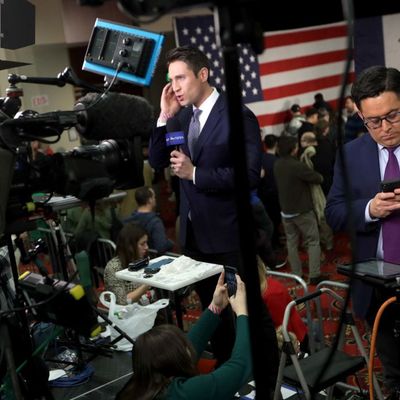
The “first-in-the-nation” Iowa caucuses died Monday night after a protracted battle with advanced-stage omnishambles.
Or so we can hope. Iowa’s eccentric, endearing — and wildly anti-democratic — nominating contest has always been an indefensible institution. There is no reason why the most politically-engaged and/or time-rich citizens of America’s 31st most populous state should have the power to veto presidential candidates before anyone else in the country has a say. And yet, few of Iowa’s bitterest critics ever dreamed it would subject the country to something like this.
As of this writing, we are one hour into Tuesday morning and only a small fraction of Iowa precincts have reported their results. Officials currently say that they hope to have the numbers by “some time Tuesday.” The ostensible reasons for this are twofold. 1) This year, for the first time ever, the Iowa Democratic Party was required to report three distinct sets of results — the vote tally on “first alignment,” the vote tally on “final alignment” (when backers of candidates who lack 15% support redistribute their votes to higher-polling candidates), and the final delegate tally. In the past, the party was only on the hook for that last metric, which is much easier to tabulate. 2) To ease the burden of logging all this information from more than 1,600 precincts, the party developed an app for reporting results — which many precinct chairs could not figure out how to use. Thus, they began calling in the results on a telephone hotline. Much waiting on hold ensued.
These two developments produced “inconsistencies in the reporting of three sets of results,” according to the Iowa Democrats’ communications director. “In addition to the tech systems being used to tabulate results, we are also using photos of results and a paper trail to validate that all results match and ensure that we have confidence and accuracy in the numbers we report” she went on to tell reporters. “This is simply a reporting issue, the app did not go down and this is not a hack or an intrusion. The underlying data and paper trail is sound and will simply take time to further report the results.”
At this point, there’s no reason to doubt the veracity of these remarks. But even if the paper trail is, in fact, sound — and we do eventually get clean, clear results — a good deal of damage will have already been done.
Iowa has only 41 delegates to bestow, in a race where several thousand are up for grabs. Candidates did not spend the past year bombarding the Hawkeye state’s airwaves with advertisements, inundating its neighborhoods with canvassers, and kissing babies at its state fairs for measly delegates. This was a contest for a timely burst of positive media coverage. The reason the Iowa caucuses matter is that, historically, their winner sees a roughly 7-point polling bounce — a burst of “momentum” that quite often carries them all the way to the nomination.
Before Monday night’s fiasco, there was already reason to think that the value of a victory in Iowa would be lower in 2020 than it had been in previous years. In the Trump era, with the news cycle spinning at a dizzying rate, the winner of the Iowa caucuses could scarcely expect their triumph to remain the top story for more than a day — especially since a State of the Union address, conclusion of the Senate impeachment trial, and a global pandemic were already certain to claim a heavy chunk of the week’s headlines. Now, the final results of Iowa’s election won’t even make front-page news tomorrow morning. Even if we do get the results by midday — which appears to be far from certain — the fiasco will remain bigger news than the actual outcome. Which means, in a certain sense, no Democrat is going to win this year’s Iowa caucuses, only an ersatz consolation prize.
This has the supporters of the two candidates who appeared to be on their way to strong nights — Bernie Sanders and Pete Buttigieg — understandably irritated if not apoplectic. And some of these voters are embracing paranoid conspiracism with the gleeful encouragement of Donald Trump’s reelection campaign. The paper trail may salvage the results of tonight’s caucuses. But confidence in the integrity of those results may be irrevocably squandered.
Meanwhile, the evening’s events have effectively produced a five-hour-long informercial for the Democratic Party’s administrative incompetence, broadcast across all of the major news networks.
All of this said, one can’t say that nothing good came of this year’s Iowa caucuses; they do appear to have created a broad consensus that corn country’s ridiculous quadrennial ritual should be put out of its misery.






























